外研版2017年中考一轮教材复习课件:外研七年级下册 Modules 7-9
文档属性
| 名称 | 外研版2017年中考一轮教材复习课件:外研七年级下册 Modules 7-9 | 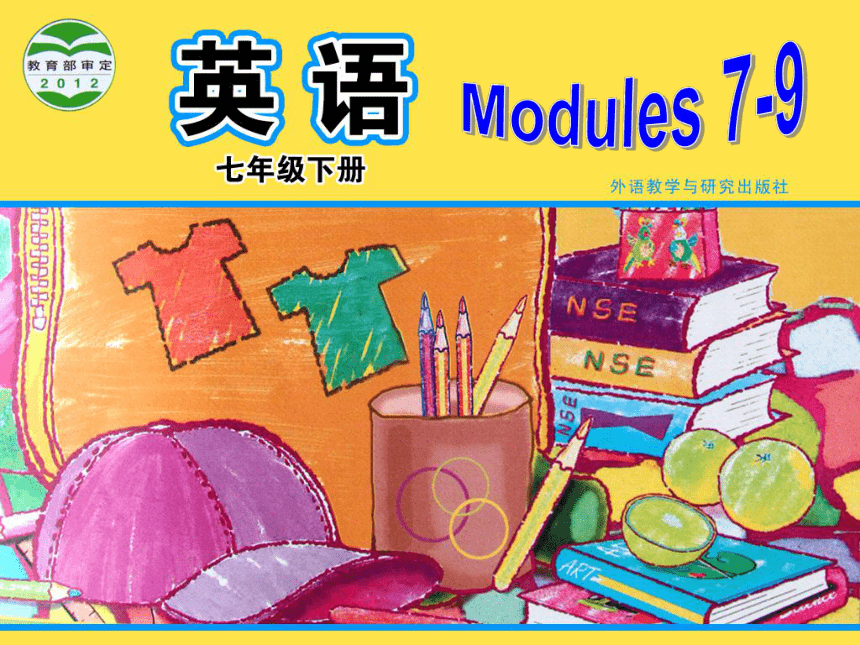 | |
| 格式 | zip | ||
| 文件大小 | 1005.0KB | ||
| 资源类型 | 教案 | ||
| 版本资源 | 外研版 | ||
| 科目 | 英语 | ||
| 更新时间 | 2017-01-25 16:34:54 | ||
图片预览

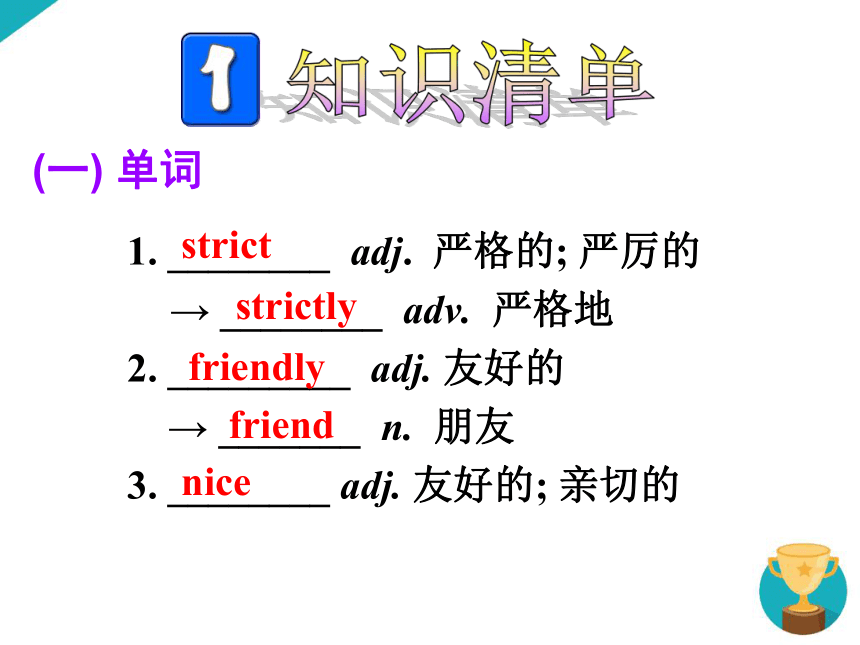
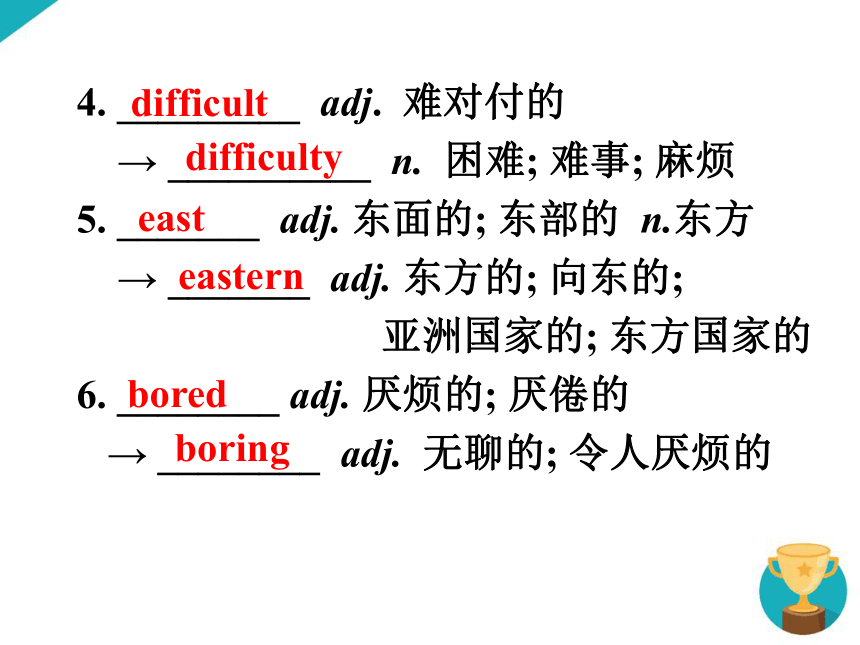
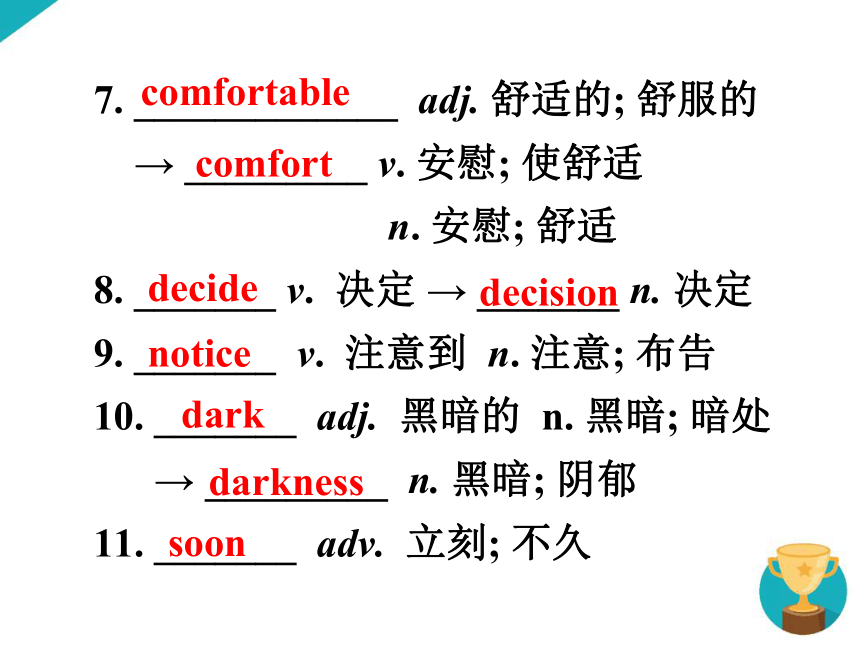
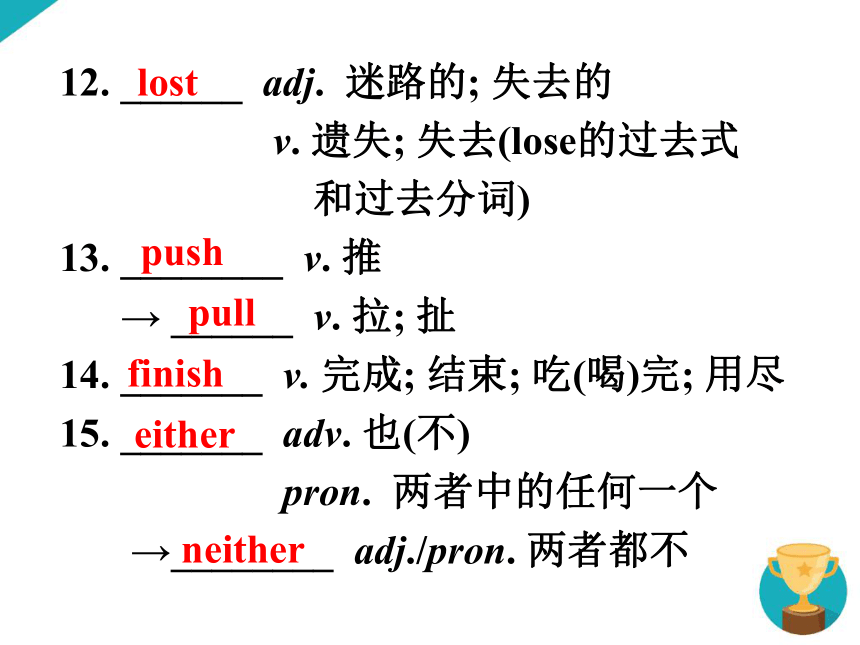
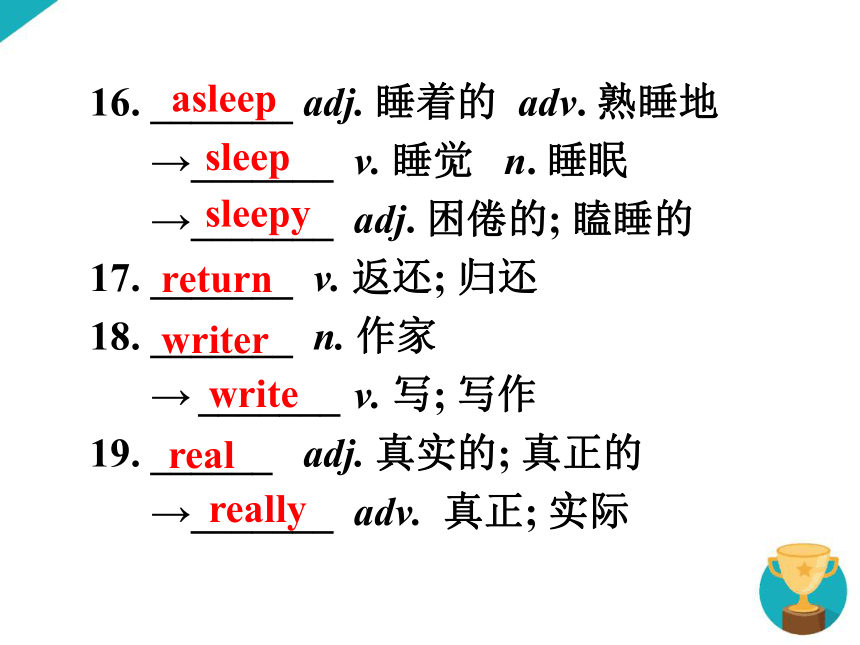
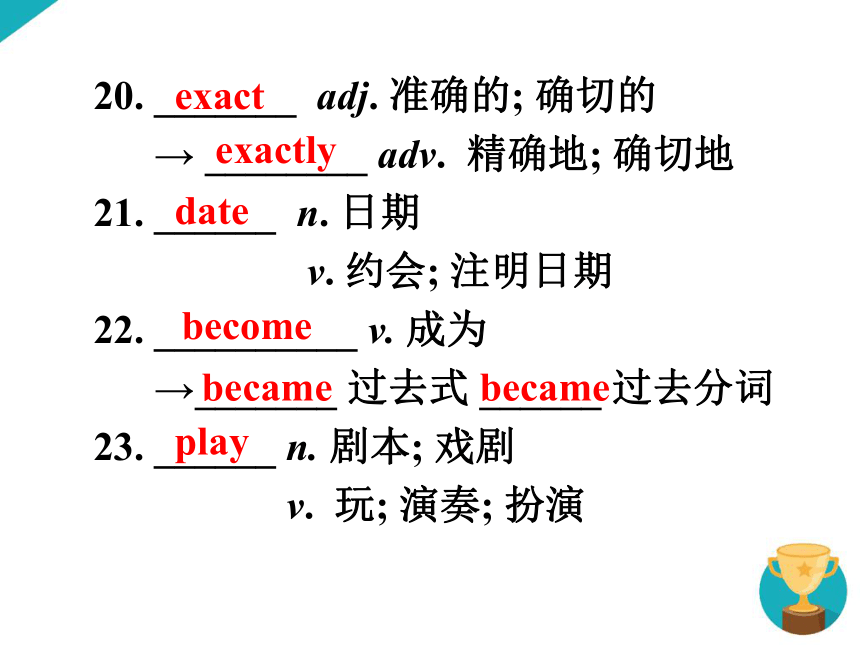
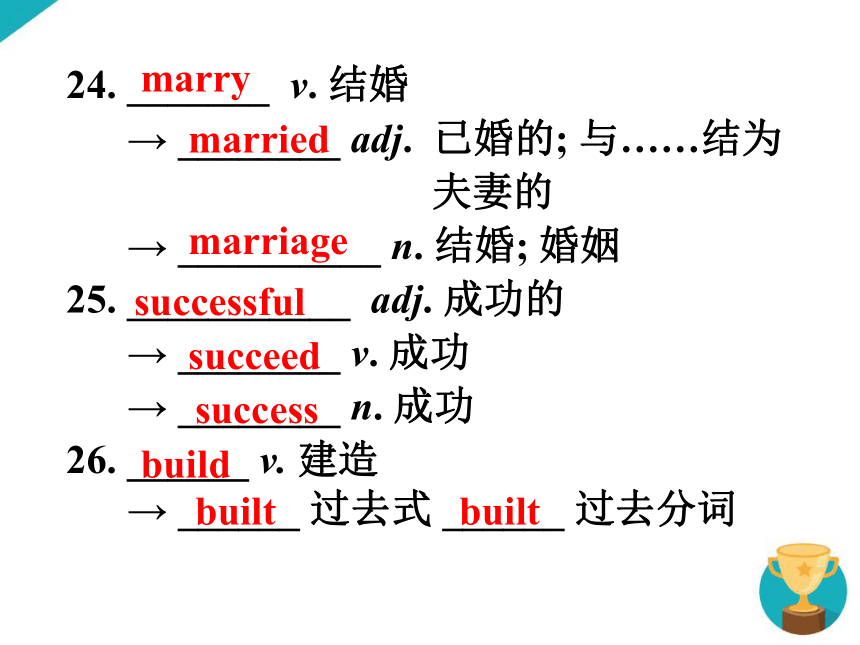
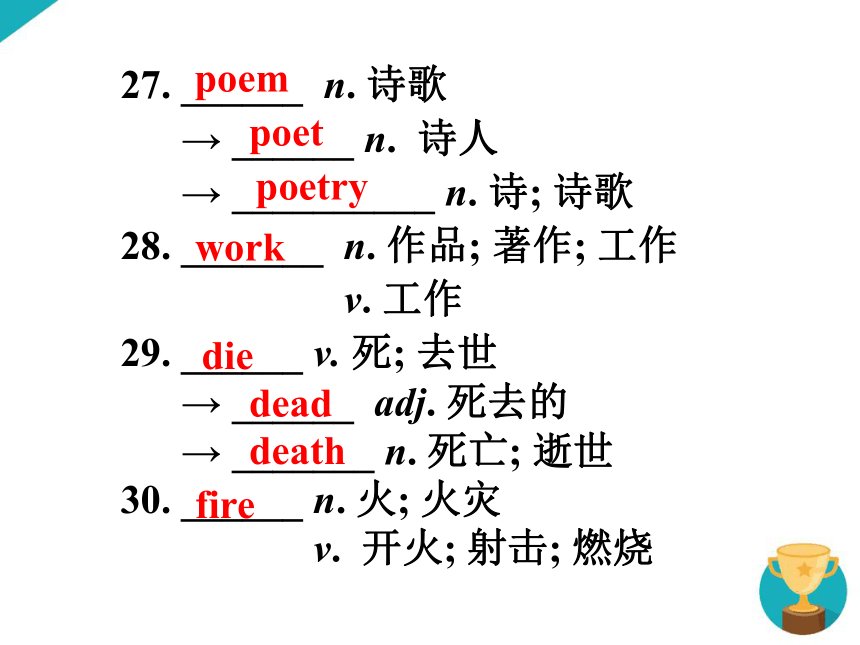
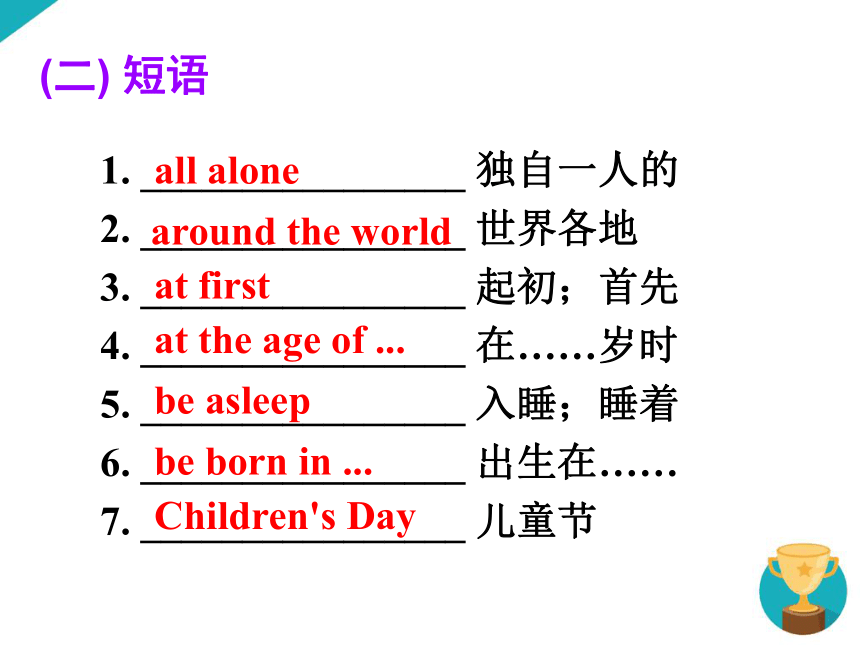
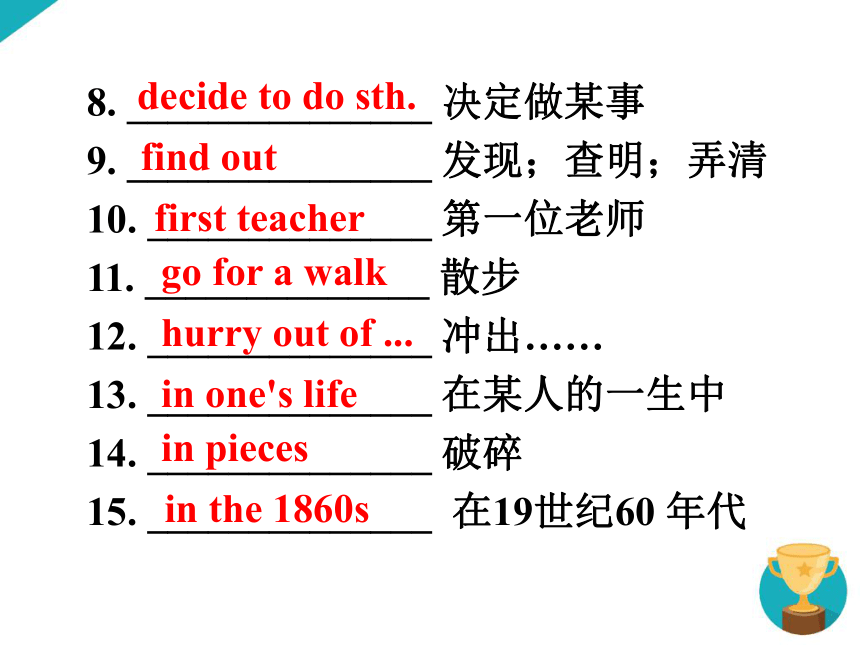
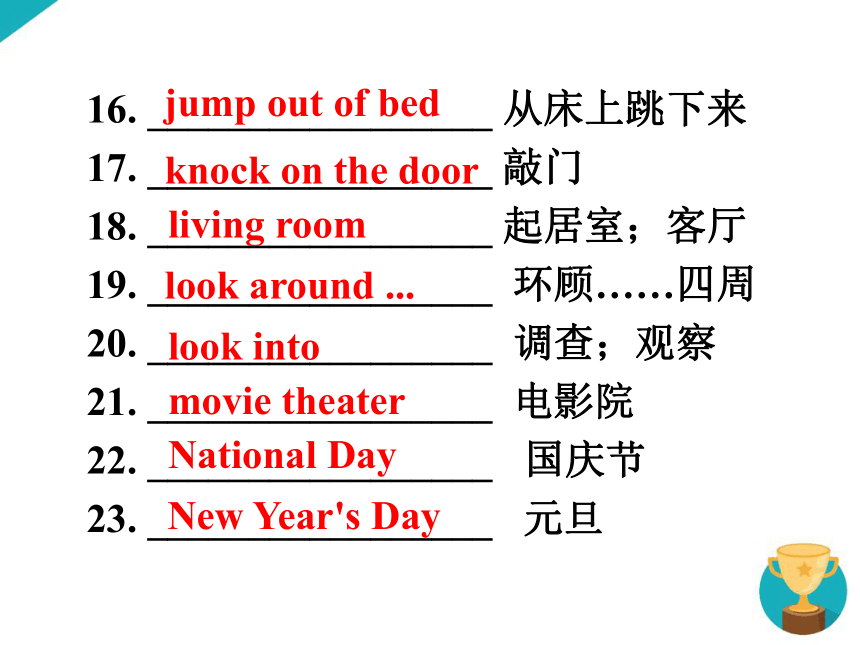
文档简介
课件64张PPT。Modules 7-91. ________ adj. 严格的; 严厉的 → ________ adv. 严格地
2. _________ adj. 友好的
→ _______ n. 朋友
3. ________ adj. 友好的; 亲切的知识清单(一) 单词strictfriendlynicestrictlyfriend4. _________ adj. 难对付的
→ __________ n. 困难; 难事; 麻烦
5. _______ adj. 东面的; 东部的 n.东方
→ _______ adj. 东方的; 向东的;
亚洲国家的; 东方国家的
6. ________ adj. 厌烦的; 厌倦的
→ ________ adj. 无聊的; 令人厌烦的difficult eastdifficultyeasternboredboring7. _____________ adj. 舒适的; 舒服的
→ _________ v. 安慰; 使舒适
n. 安慰; 舒适
8. _______ v. 决定 → _______ n. 决定
9. _______ v. 注意到 n. 注意; 布告
10. _______ adj. 黑暗的 n. 黑暗; 暗处
→ _________ n. 黑暗; 阴郁
11. _______ adv. 立刻; 不久comfortabledecidecomfortdarkdarkness noticesoon decision12. ______ adj. 迷路的; 失去的
v. 遗失; 失去(lose的过去式
和过去分词)
13. ________ v. 推
→ ______ v. 拉; 扯
14. _______ v. 完成; 结束; 吃(喝)完; 用尽
15. _______ adv. 也(不)
pron. 两者中的任何一个
→________ adj./pron. 两者都不push lostpull finish eitherneither16. _______ adj. 睡着的 adv. 熟睡地
→_______ v. 睡觉 n. 睡眠
→_______ adj. 困倦的; 瞌睡的
17. _______ v. 返还; 归还
18. _______ n. 作家
→ _______ v. 写; 写作
19. ______ adj. 真实的; 真正的
→_______ adv. 真正; 实际asleepsleep sleepyreturn writerwrite real really20. _______ adj. 准确的; 确切的
→ ________ adv. 精确地; 确切地
21. ______ n. 日期
v. 约会; 注明日期
22. __________ v. 成为
→_______ 过去式 ______ 过去分词
23. ______ n. 剧本; 戏剧
v. 玩; 演奏; 扮演exactexactlydateplay becomebecamebecame24. _______ v. 结婚
→ ________ adj. 已婚的; 与……结为
夫妻的
→ __________ n. 结婚; 婚姻
25. ___________ adj. 成功的
→ ________ v. 成功
→ ________ n. 成功
26. ______ v. 建造
→ ______ 过去式 ______ 过去分词 marrymarriedmarriagebuild successfulsucceedsuccessbuilt built 27. ______ n. 诗歌
→ ______ n. 诗人
→ __________ n. 诗; 诗歌
28. _______ n. 作品; 著作; 工作
v. 工作
29. ______ v. 死; 去世
→ ______ adj. 死去的
→ _______ n. 死亡; 逝世
30. ______ n. 火; 火灾
v. 开火; 射击; 燃烧poempoetworkdiedeaddeathpoetryfire1. ________________?独自一人的
2. ________________?世界各地
3. ________________?起初;首先
4. ________________?在……岁时
5. ________________ 入睡;睡着
6. ________________ 出生在……
7. ________________ 儿童节(二) 短语all alone ???around the world ? at first at the age of ...? be asleep be born in ... ?Children's Day 8. _______________ 决定做某事
9. _______________ 发现;查明;弄清
10. ______________ 第一位老师
11. ______________ 散步
12. ______________ 冲出…… ?
13. ______________ 在某人的一生中
14. ______________?破碎
15. ______________??在19世纪60?年代 ?decide to do sth.?find out go for a walk hurry out of ... in one's life first teacher in pieces ?in the 1860s 16. _________________?从床上跳下来
17. _________________ 敲门
18. _________________ 起居室;客厅 ?
19. _________________ ?环顾……四周
20. _________________ ?调查;观察
21. _________________ 电影院
22. _________________ ??国庆节
23. _________________ 元旦 ?jump out of bed ??knock on the door living room ?look around ... ?look into movie theater ?National Day New Year's Day 24. __________________在……的东海岸
25. ________________ 从前
26. ________________ 睁开眼睛 ?
27. ________________ 拿起; 举起 ?
28. ________________?指着……
29. ________________ 小学
30. _________________ 坐下
31. _________________ 教师节
32. __________________ 妇女节Teachers' DayWomen's Dayon the east coast of ... once upon a time open one's eyes pick up point at ... Primary school sit down 1. Where were you born?
2. What was the name of your first school?
3. Who was your first teacher?
4. She was strict but very nice.
5. What were they like?
6. Becky was very good in class but Adam wasn't.(三)句型 7. Were you difficult in class too?
8. There was a big living room with a TV, a kitchen, a bathroom and three bedrooms.
9. It was great to play there.
10. ... I'm looking forward to seeing my friends again.
11. ... did she often go for a walk in the forest alone?12. There was nobody there.
13. Didn't anyone live in the house?
14. On a table there were three bowls with some nice food in them.
15. One bowl was small, one was big and one was very big.
16. She didn't like the middle bed or the big bed.
17. There's the bad girl!18. What are you reading?
19. I'm writing about him for my English
class.
20. He wrote for a newspaper.
21. Enjoy the book.
22. William Shakespeare was a famous
English writer of plays and poems.
23. You can still see his plays in English
and in many other languages.核心要点(一) 单词1. strict adj. 严厉的; 严格的 【归纳】
常用搭配:
be strict in sth. 在某方面严格
be strict with sb. 对某人要求严格2. bored adj. 厌倦的; 厌烦的【归纳】
bored常用人作主语或修饰人。其常用结构为“be bored with”, 意为“对……感到厌烦”。
【拓展】
boring常用物作主语或修饰物, 在句中既可作表语, 又可作定语。3. once adv. 一次; 一回【归纳】
1) 在常用短语once upon a time中, once作“曾经/从前”讲, 常用于一般过去时。
2) once作“次”讲时, 可以构成短语once a week/month/year等, 常用于一般现在时。 【拓展】
含有once的短语:
once again 一再, 再三
once or twice 一两次
at once 立刻4. pick v. 采; 摘; 挑选, 选择
【归纳】
pick up意为“捡起; 接电话”。若接名词作宾语, 名词放在up前后都可以; 若接代词作宾语, 代词要放在pick和up之间。 【中考链接】
--- Look! What’s on the ground?
--- Oh, it’s my sweater. Please _____.
A. pick it up B. put it on
C. give it out D. take it off
(2015 陕西)5. either adv. 也(不)
【归纳】
either作副词时, 用于否定句中, 位于
句尾。如:
She isn’t late either. 她也没有迟到。
【拓展】
either还可以用作代词, 意为“(两者之中)
任一, 任何一个”。如:
Either of the books is popular with the
students.【中考链接】
You can take _____ of the two toy cars and leave the other for your brother.
A. both B. none
C. either D. neither
(2014 安徽)6. marry v. 结婚
【归纳】
常用搭配:
marry sb. 嫁给某人, 娶某人
marry sb. to sb. 把某人嫁给某人
be/get married to sb. 与某人结婚 7. rich adj. 富有的
【归纳】
当主语是人时, rich意为“富裕的; 有钱的”; 当主语是特时, 其常用短语为be rich in, 意为“在……方面富有”, 其反义短语是be poor in, 意为“在……方面贫乏”。
【拓展】
the rich意为“富人”, 作主语时, 谓语动词用复数形式。8. east adj. 东面的, 东部的 n. 东方
【归纳】
east, west, south, north等方位词常与介词in, on和to连用。其区别是:
表示A在B范围内用in;
表示A、B接壤用on;
表示A、B不相邻用to。9. return v. 返回; 归还
【归纳】
return作“返回”讲时, 常和介词to搭配, 后接地点名词, 相当于come/go back。
return作“归还”讲时, 常用短语return sth. to sb. (return sb. sth.), 意为“把某物归还某人”, 相当于give sth. back to sb.。1. be born 出生于
【归纳】
be born常用于一般过去时态的句子中。常用搭配:
be born in + 年份/月份/地点;
be born on + 日期;
be born into… 出生于…..家庭。(二)短语2. 辨析: find out/look for
find out 多指通过探索、观察而发现, 后面接“无形或隐藏的东西”。
look for意为“寻找”, 是find之前的过程; find意为“找到, 发现”, 是look for的结果。
如: I looked for my pen everywhere and
finally I found it on the floor.3. at the age of 在……岁时
【归纳】
at the age of 后接基数词, 相当于when引导的时间状语从句, 即when … was/ were … years old。
【拓展】
表示“在……岁”时, 还可直接用“at + 数字”。如:
At 28, Shakespeare moved to London.1. What were they like?
他们怎么样?
【归纳】
What be sb. like? 用于询问某人内在
的品质、性格等
【拓展】
What do/does/did/will sb. look like?
用来询问外貌。(三) 句式【中考链接】
-- ____________?
-- He is of medium build and has
straight hair.
A. What does his uncle do
B. What does his uncle look like
C. What can his uncle do
D. What is his uncle doing
(2014 昆明)2. There were lots of things to do in Quincy…
在昆西有许多事情可做……
【归纳】
在“there be + 主语 + to do”句型中, 主语多为要做的事情, 与to do之间为动宾关系。
【拓展】
在“there be + 主语 + doing”句型中, 主语多为doing的动作发出者, 它们之间存在主谓关系。【中考链接】
-- Listen! There ______ someone _____
at the door.
-- It must be your sister.
A. is; knocking
B. is; knock
C. are; knocking
D. are; knock
(2015 青岛)3. --- What does she look like?
她长什么样?
--- She has long straight hair.
她留着长直发。
【归纳】
What does/do sb. look like? 用于询问
某人的外貌长相, like是介词, 意为
“像”。 (四)交际用语 一、顺序(Sequence)
First, she looked around her.
Then, she noticed a little house.
Finally, she pushed the door.
What did you do next?二、时段(Duration)
A. When were you born?
When did you live in?Beijing?
B. In 1995.
I lived in?Beijing?from 1996 to 1999.
三、形状(Shape)
A. What was Betty's house like?
What's the shape of the cloud?
B. It was big.
It's round / long.语法一般过去时
用法:
1.?一般过去时可以表示过去某个时间发生的动作或存在的状态,常与yesterday, three years ago, last night, just now, the day before yesterday等表示过去的时间状语连用。如: I stayed at home last night.
Tom lived with his grandparents in the countryside three years ago.
2.?一般过去时还可以表示过去经常或反复发生的动作,常与often, usually, sometimes等表示频率的副词连用。如:
When we were young, we often played table tennis together.结构: 如:
My grandmother was a teacher in the past.
He didn't go to the party last night.
Was your old school in?Pingyang Street?
Where did you go last week?
温馨提示:
行为动词的过去式规则变化通常在词尾加
-ed,不规则变化要牢记。【中考链接】
I. 单项选择。
1. — Why didn't Peter _________ his
homework?
— He said he had lost his workbook. I
think it's an excuse.
A. does ? ? ? ? ? B. doing??
C. do ? ? ? ? ? ? D. did?????
?(2015?江苏南京)2. — When will Uncle Sam come to see us?
— He'll visit us this weekend. He
_________ me that by email.
A. told?? ?????????????????B. is told??? ?
C. will tell ? ? ? ? ? ? ?D. was going to tell???
?(2015?江苏南京)3. —When ________ you ________ here?
—Two days ago.
A. did; come????? ????? B. have; come????
C. will; come ? ? ? ? ? ?D. do; come
? (2015?天津)4. —Why didn't you buy any bread?
—Sorry, I _________.
A. forget ? ? ? ? ? ? ? ? ? ?B. forgot???? ??????
C. remember ? ? ? ? ? ? D. remembered
(2015?重庆)5. —Will you see the film?Cinderella?with us tonight?
—No, I _________ it last week.
A. see???? ?????????????????
B. have seen? ??????
C. saw?
?(2015?湖南长沙)6. I ________ a camera two weeks ago but
I haven't had a chance to use it.
A. have bought ???????????
B. bought? ???
C. will buy
? (2015?黑龙江哈尔滨)7. —A nice car! Is it yours?
—No, it isn't. I _________ it from a friend of mine two days ago.
A. borrow??????? ????? B. have borrowed??
C. will borrow?? ???????? D. borrowed???
?(2015?湖北武汉)Ⅱ.?词汇
1. Helen ________(点头) with a smile
when she met me.? (2015?江苏苏州)
2. He told his parents his ideas about the
camping several times, and they
________(同意) with him at last.?????????
?(2015?江苏连云港)nodded?agreed 3. Mother w_____ me up at 6 o'clock yesterday morning and told me it was time to get up.??????????????????
?(2015?浙江杭州)
4. Dr. Naismith d______ the men in his class into two teams and taught them to play basketball.?????????????????????
?(2015?浙江杭州)woke?divided? I. 根据语境及所给首字母提示, 补全所缺单词。
1. Jim crossed the street and e________ the restaurant.
2. My cousin went to?Qingdao?by train l____ week.巩固练习last?entered?3. The g_______ is big and there are
many flowers and plants in it.
4. A_____ is the fourth month of a
year.
5. Y________ was Tuesday and today is
Wednesday.
6. Look at that bridge. It was b_____
in 2013.built? ?gardenApril?Yesterday7. I'm not?Alice. My r_____ name is Helen.
8. The bedroom is very d____. We can't see anything in it.??
9. The boy went to bed and was a_______ soon.
10. Mike can speak several l_________, such as English and Chinese.languages? realdarkasleepⅡ.?根据语境从方框中选择恰当的短语填空, 有的需要变换形式, 每个短语限用一次 。on the east coast of, movie theatre, primary school, look around, hurry out of, living room, once upon a time,
open one's eyes, in the 1860s, sit down 1. There is a big playground, two high buildings in this _______________. primary school? on the east coast of, movie theatre, primary school, look around, hurry out of, living room, once upon a time,
open one's eyes, in the 1860s, sit down 2. My grandfather often watches TV in the ____________ after dinner.
3. There is a new _____________ in our city. Let's go to see a film this weekend.
4. ________________, a king and a queen lived with their three daughters.Once upon a time? living roommovie theatre?on the east coast of, movie theatre, primary school, look around, hurry out of, living room, once upon a time,
open one's eyes, in the 1860s, sit down 5. The students _______________ the classroom as soon as the bell rang.
6. Her family moved to?Australia
_____________.
7. Shenzhen is a city __________________
China.on the east coast of hurried out of?in the 1860s?on the east coast of, movie theatre, primary school, look around, hurry out of, living room, once upon a time,
open one's eyes, in the 1860s, sit down 8. He stopped the car, _____________ it
and found nothing.
9. The girl ________________ after
sleeping for about twelve hours. She felt
better.
10. Please __________ and drink a cup of
tea.sit down?looked around??opened her eyesIII. 根据括号内所给英文提示语将下列句
子翻译成英语。
1.?你朋友什么时候出生的?(be born)
When was your friend born??
2.?我通常晚饭后散步。(go for a walk)
I usually go for a walk after dinner.
3. 昨天他独自一人在家。(all alone)
He was at home all alone yesterday.?? 4.?她拿起包离开了房间。(pick up)
She picked up the bag and left the
room.
5.?起初他们工作很努力。(at first)
They worked hard at first.??
6.?我们将会发现你的所有秘密。(find out)
We will find out all your secrets.
7.?谁在敲门?(knock on)
Who is knocking on the door???? 8.?我爷爷一生都没有坐过飞机。(in one's
life)
My grandfather didn't take a plane in
his life.
9.?他指着照片什么也没有说。(point at)
He pointed at the photo and said
nothing.?
10.?房间里空无一人。(nobody)
There is nobody in the room.
2. _________ adj. 友好的
→ _______ n. 朋友
3. ________ adj. 友好的; 亲切的知识清单(一) 单词strictfriendlynicestrictlyfriend4. _________ adj. 难对付的
→ __________ n. 困难; 难事; 麻烦
5. _______ adj. 东面的; 东部的 n.东方
→ _______ adj. 东方的; 向东的;
亚洲国家的; 东方国家的
6. ________ adj. 厌烦的; 厌倦的
→ ________ adj. 无聊的; 令人厌烦的difficult eastdifficultyeasternboredboring7. _____________ adj. 舒适的; 舒服的
→ _________ v. 安慰; 使舒适
n. 安慰; 舒适
8. _______ v. 决定 → _______ n. 决定
9. _______ v. 注意到 n. 注意; 布告
10. _______ adj. 黑暗的 n. 黑暗; 暗处
→ _________ n. 黑暗; 阴郁
11. _______ adv. 立刻; 不久comfortabledecidecomfortdarkdarkness noticesoon decision12. ______ adj. 迷路的; 失去的
v. 遗失; 失去(lose的过去式
和过去分词)
13. ________ v. 推
→ ______ v. 拉; 扯
14. _______ v. 完成; 结束; 吃(喝)完; 用尽
15. _______ adv. 也(不)
pron. 两者中的任何一个
→________ adj./pron. 两者都不push lostpull finish eitherneither16. _______ adj. 睡着的 adv. 熟睡地
→_______ v. 睡觉 n. 睡眠
→_______ adj. 困倦的; 瞌睡的
17. _______ v. 返还; 归还
18. _______ n. 作家
→ _______ v. 写; 写作
19. ______ adj. 真实的; 真正的
→_______ adv. 真正; 实际asleepsleep sleepyreturn writerwrite real really20. _______ adj. 准确的; 确切的
→ ________ adv. 精确地; 确切地
21. ______ n. 日期
v. 约会; 注明日期
22. __________ v. 成为
→_______ 过去式 ______ 过去分词
23. ______ n. 剧本; 戏剧
v. 玩; 演奏; 扮演exactexactlydateplay becomebecamebecame24. _______ v. 结婚
→ ________ adj. 已婚的; 与……结为
夫妻的
→ __________ n. 结婚; 婚姻
25. ___________ adj. 成功的
→ ________ v. 成功
→ ________ n. 成功
26. ______ v. 建造
→ ______ 过去式 ______ 过去分词 marrymarriedmarriagebuild successfulsucceedsuccessbuilt built 27. ______ n. 诗歌
→ ______ n. 诗人
→ __________ n. 诗; 诗歌
28. _______ n. 作品; 著作; 工作
v. 工作
29. ______ v. 死; 去世
→ ______ adj. 死去的
→ _______ n. 死亡; 逝世
30. ______ n. 火; 火灾
v. 开火; 射击; 燃烧poempoetworkdiedeaddeathpoetryfire1. ________________?独自一人的
2. ________________?世界各地
3. ________________?起初;首先
4. ________________?在……岁时
5. ________________ 入睡;睡着
6. ________________ 出生在……
7. ________________ 儿童节(二) 短语all alone ???around the world ? at first at the age of ...? be asleep be born in ... ?Children's Day 8. _______________ 决定做某事
9. _______________ 发现;查明;弄清
10. ______________ 第一位老师
11. ______________ 散步
12. ______________ 冲出…… ?
13. ______________ 在某人的一生中
14. ______________?破碎
15. ______________??在19世纪60?年代 ?decide to do sth.?find out go for a walk hurry out of ... in one's life first teacher in pieces ?in the 1860s 16. _________________?从床上跳下来
17. _________________ 敲门
18. _________________ 起居室;客厅 ?
19. _________________ ?环顾……四周
20. _________________ ?调查;观察
21. _________________ 电影院
22. _________________ ??国庆节
23. _________________ 元旦 ?jump out of bed ??knock on the door living room ?look around ... ?look into movie theater ?National Day New Year's Day 24. __________________在……的东海岸
25. ________________ 从前
26. ________________ 睁开眼睛 ?
27. ________________ 拿起; 举起 ?
28. ________________?指着……
29. ________________ 小学
30. _________________ 坐下
31. _________________ 教师节
32. __________________ 妇女节Teachers' DayWomen's Dayon the east coast of ... once upon a time open one's eyes pick up point at ... Primary school sit down 1. Where were you born?
2. What was the name of your first school?
3. Who was your first teacher?
4. She was strict but very nice.
5. What were they like?
6. Becky was very good in class but Adam wasn't.(三)句型 7. Were you difficult in class too?
8. There was a big living room with a TV, a kitchen, a bathroom and three bedrooms.
9. It was great to play there.
10. ... I'm looking forward to seeing my friends again.
11. ... did she often go for a walk in the forest alone?12. There was nobody there.
13. Didn't anyone live in the house?
14. On a table there were three bowls with some nice food in them.
15. One bowl was small, one was big and one was very big.
16. She didn't like the middle bed or the big bed.
17. There's the bad girl!18. What are you reading?
19. I'm writing about him for my English
class.
20. He wrote for a newspaper.
21. Enjoy the book.
22. William Shakespeare was a famous
English writer of plays and poems.
23. You can still see his plays in English
and in many other languages.核心要点(一) 单词1. strict adj. 严厉的; 严格的 【归纳】
常用搭配:
be strict in sth. 在某方面严格
be strict with sb. 对某人要求严格2. bored adj. 厌倦的; 厌烦的【归纳】
bored常用人作主语或修饰人。其常用结构为“be bored with”, 意为“对……感到厌烦”。
【拓展】
boring常用物作主语或修饰物, 在句中既可作表语, 又可作定语。3. once adv. 一次; 一回【归纳】
1) 在常用短语once upon a time中, once作“曾经/从前”讲, 常用于一般过去时。
2) once作“次”讲时, 可以构成短语once a week/month/year等, 常用于一般现在时。 【拓展】
含有once的短语:
once again 一再, 再三
once or twice 一两次
at once 立刻4. pick v. 采; 摘; 挑选, 选择
【归纳】
pick up意为“捡起; 接电话”。若接名词作宾语, 名词放在up前后都可以; 若接代词作宾语, 代词要放在pick和up之间。 【中考链接】
--- Look! What’s on the ground?
--- Oh, it’s my sweater. Please _____.
A. pick it up B. put it on
C. give it out D. take it off
(2015 陕西)5. either adv. 也(不)
【归纳】
either作副词时, 用于否定句中, 位于
句尾。如:
She isn’t late either. 她也没有迟到。
【拓展】
either还可以用作代词, 意为“(两者之中)
任一, 任何一个”。如:
Either of the books is popular with the
students.【中考链接】
You can take _____ of the two toy cars and leave the other for your brother.
A. both B. none
C. either D. neither
(2014 安徽)6. marry v. 结婚
【归纳】
常用搭配:
marry sb. 嫁给某人, 娶某人
marry sb. to sb. 把某人嫁给某人
be/get married to sb. 与某人结婚 7. rich adj. 富有的
【归纳】
当主语是人时, rich意为“富裕的; 有钱的”; 当主语是特时, 其常用短语为be rich in, 意为“在……方面富有”, 其反义短语是be poor in, 意为“在……方面贫乏”。
【拓展】
the rich意为“富人”, 作主语时, 谓语动词用复数形式。8. east adj. 东面的, 东部的 n. 东方
【归纳】
east, west, south, north等方位词常与介词in, on和to连用。其区别是:
表示A在B范围内用in;
表示A、B接壤用on;
表示A、B不相邻用to。9. return v. 返回; 归还
【归纳】
return作“返回”讲时, 常和介词to搭配, 后接地点名词, 相当于come/go back。
return作“归还”讲时, 常用短语return sth. to sb. (return sb. sth.), 意为“把某物归还某人”, 相当于give sth. back to sb.。1. be born 出生于
【归纳】
be born常用于一般过去时态的句子中。常用搭配:
be born in + 年份/月份/地点;
be born on + 日期;
be born into… 出生于…..家庭。(二)短语2. 辨析: find out/look for
find out 多指通过探索、观察而发现, 后面接“无形或隐藏的东西”。
look for意为“寻找”, 是find之前的过程; find意为“找到, 发现”, 是look for的结果。
如: I looked for my pen everywhere and
finally I found it on the floor.3. at the age of 在……岁时
【归纳】
at the age of 后接基数词, 相当于when引导的时间状语从句, 即when … was/ were … years old。
【拓展】
表示“在……岁”时, 还可直接用“at + 数字”。如:
At 28, Shakespeare moved to London.1. What were they like?
他们怎么样?
【归纳】
What be sb. like? 用于询问某人内在
的品质、性格等
【拓展】
What do/does/did/will sb. look like?
用来询问外貌。(三) 句式【中考链接】
-- ____________?
-- He is of medium build and has
straight hair.
A. What does his uncle do
B. What does his uncle look like
C. What can his uncle do
D. What is his uncle doing
(2014 昆明)2. There were lots of things to do in Quincy…
在昆西有许多事情可做……
【归纳】
在“there be + 主语 + to do”句型中, 主语多为要做的事情, 与to do之间为动宾关系。
【拓展】
在“there be + 主语 + doing”句型中, 主语多为doing的动作发出者, 它们之间存在主谓关系。【中考链接】
-- Listen! There ______ someone _____
at the door.
-- It must be your sister.
A. is; knocking
B. is; knock
C. are; knocking
D. are; knock
(2015 青岛)3. --- What does she look like?
她长什么样?
--- She has long straight hair.
她留着长直发。
【归纳】
What does/do sb. look like? 用于询问
某人的外貌长相, like是介词, 意为
“像”。 (四)交际用语 一、顺序(Sequence)
First, she looked around her.
Then, she noticed a little house.
Finally, she pushed the door.
What did you do next?二、时段(Duration)
A. When were you born?
When did you live in?Beijing?
B. In 1995.
I lived in?Beijing?from 1996 to 1999.
三、形状(Shape)
A. What was Betty's house like?
What's the shape of the cloud?
B. It was big.
It's round / long.语法一般过去时
用法:
1.?一般过去时可以表示过去某个时间发生的动作或存在的状态,常与yesterday, three years ago, last night, just now, the day before yesterday等表示过去的时间状语连用。如: I stayed at home last night.
Tom lived with his grandparents in the countryside three years ago.
2.?一般过去时还可以表示过去经常或反复发生的动作,常与often, usually, sometimes等表示频率的副词连用。如:
When we were young, we often played table tennis together.结构: 如:
My grandmother was a teacher in the past.
He didn't go to the party last night.
Was your old school in?Pingyang Street?
Where did you go last week?
温馨提示:
行为动词的过去式规则变化通常在词尾加
-ed,不规则变化要牢记。【中考链接】
I. 单项选择。
1. — Why didn't Peter _________ his
homework?
— He said he had lost his workbook. I
think it's an excuse.
A. does ? ? ? ? ? B. doing??
C. do ? ? ? ? ? ? D. did?????
?(2015?江苏南京)2. — When will Uncle Sam come to see us?
— He'll visit us this weekend. He
_________ me that by email.
A. told?? ?????????????????B. is told??? ?
C. will tell ? ? ? ? ? ? ?D. was going to tell???
?(2015?江苏南京)3. —When ________ you ________ here?
—Two days ago.
A. did; come????? ????? B. have; come????
C. will; come ? ? ? ? ? ?D. do; come
? (2015?天津)4. —Why didn't you buy any bread?
—Sorry, I _________.
A. forget ? ? ? ? ? ? ? ? ? ?B. forgot???? ??????
C. remember ? ? ? ? ? ? D. remembered
(2015?重庆)5. —Will you see the film?Cinderella?with us tonight?
—No, I _________ it last week.
A. see???? ?????????????????
B. have seen? ??????
C. saw?
?(2015?湖南长沙)6. I ________ a camera two weeks ago but
I haven't had a chance to use it.
A. have bought ???????????
B. bought? ???
C. will buy
? (2015?黑龙江哈尔滨)7. —A nice car! Is it yours?
—No, it isn't. I _________ it from a friend of mine two days ago.
A. borrow??????? ????? B. have borrowed??
C. will borrow?? ???????? D. borrowed???
?(2015?湖北武汉)Ⅱ.?词汇
1. Helen ________(点头) with a smile
when she met me.? (2015?江苏苏州)
2. He told his parents his ideas about the
camping several times, and they
________(同意) with him at last.?????????
?(2015?江苏连云港)nodded?agreed 3. Mother w_____ me up at 6 o'clock yesterday morning and told me it was time to get up.??????????????????
?(2015?浙江杭州)
4. Dr. Naismith d______ the men in his class into two teams and taught them to play basketball.?????????????????????
?(2015?浙江杭州)woke?divided? I. 根据语境及所给首字母提示, 补全所缺单词。
1. Jim crossed the street and e________ the restaurant.
2. My cousin went to?Qingdao?by train l____ week.巩固练习last?entered?3. The g_______ is big and there are
many flowers and plants in it.
4. A_____ is the fourth month of a
year.
5. Y________ was Tuesday and today is
Wednesday.
6. Look at that bridge. It was b_____
in 2013.built? ?gardenApril?Yesterday7. I'm not?Alice. My r_____ name is Helen.
8. The bedroom is very d____. We can't see anything in it.??
9. The boy went to bed and was a_______ soon.
10. Mike can speak several l_________, such as English and Chinese.languages? realdarkasleepⅡ.?根据语境从方框中选择恰当的短语填空, 有的需要变换形式, 每个短语限用一次 。on the east coast of, movie theatre, primary school, look around, hurry out of, living room, once upon a time,
open one's eyes, in the 1860s, sit down 1. There is a big playground, two high buildings in this _______________. primary school? on the east coast of, movie theatre, primary school, look around, hurry out of, living room, once upon a time,
open one's eyes, in the 1860s, sit down 2. My grandfather often watches TV in the ____________ after dinner.
3. There is a new _____________ in our city. Let's go to see a film this weekend.
4. ________________, a king and a queen lived with their three daughters.Once upon a time? living roommovie theatre?on the east coast of, movie theatre, primary school, look around, hurry out of, living room, once upon a time,
open one's eyes, in the 1860s, sit down 5. The students _______________ the classroom as soon as the bell rang.
6. Her family moved to?Australia
_____________.
7. Shenzhen is a city __________________
China.on the east coast of hurried out of?in the 1860s?on the east coast of, movie theatre, primary school, look around, hurry out of, living room, once upon a time,
open one's eyes, in the 1860s, sit down 8. He stopped the car, _____________ it
and found nothing.
9. The girl ________________ after
sleeping for about twelve hours. She felt
better.
10. Please __________ and drink a cup of
tea.sit down?looked around??opened her eyesIII. 根据括号内所给英文提示语将下列句
子翻译成英语。
1.?你朋友什么时候出生的?(be born)
When was your friend born??
2.?我通常晚饭后散步。(go for a walk)
I usually go for a walk after dinner.
3. 昨天他独自一人在家。(all alone)
He was at home all alone yesterday.?? 4.?她拿起包离开了房间。(pick up)
She picked up the bag and left the
room.
5.?起初他们工作很努力。(at first)
They worked hard at first.??
6.?我们将会发现你的所有秘密。(find out)
We will find out all your secrets.
7.?谁在敲门?(knock on)
Who is knocking on the door???? 8.?我爷爷一生都没有坐过飞机。(in one's
life)
My grandfather didn't take a plane in
his life.
9.?他指着照片什么也没有说。(point at)
He pointed at the photo and said
nothing.?
10.?房间里空无一人。(nobody)
There is nobody in the room.
